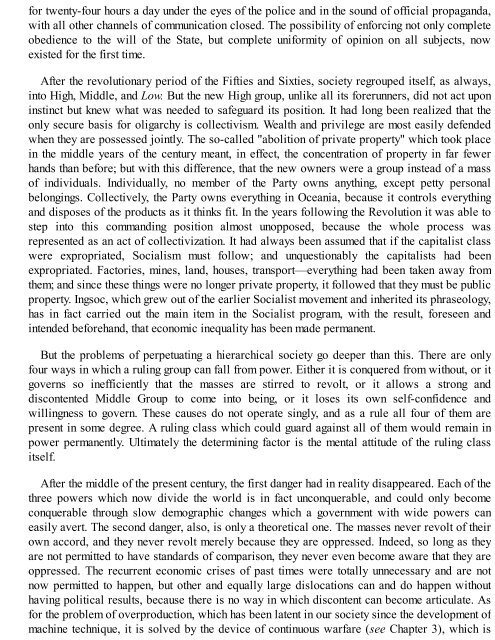Create successful ePaper yourself
Turn your PDF publications into a flip-book with our unique Google optimized e-Paper software.
for twenty-four hours a day under the eyes of the police and in the sound of official propaganda,<br />
with all other channels of communication closed. The possibility of enforcing not only complete<br />
obedience to the will of the State, but complete uniformity of opinion on all subjects, now<br />
existed for the first time.<br />
After the revolutionary period of the Fifties and Sixties, society regrouped itself, as always,<br />
into High, Middle, and Low. But the new High group, unlike all its forerunners, did not act upon<br />
instinct but knew what was needed to safeguard its position. It had long been realized that the<br />
only secure basis for oligarchy is collectivism. Wealth and privilege are most easily defended<br />
when they are possessed jointly. The so-called "abolition of private property" which took place<br />
in the middle years of the century meant, in effect, the concentration of property in far fewer<br />
hands than before; but with this difference, that the new owners were a group instead of a mass<br />
of individuals. Individually, no member of the Party owns anything, except petty personal<br />
belongings. Collectively, the Party owns everything in Oceania, because it controls everything<br />
and disposes of the products as it thinks fit. In the years following the Revolution it was able to<br />
step into this commanding position almost unopposed, because the whole process was<br />
represented as an act of collectivization. It had always been assumed that if the capitalist class<br />
were expropriated, Socialism must follow; and unquestionably the capitalists had been<br />
expropriated. Factories, mines, land, houses, transport—everything had been taken away from<br />
them; and since these things were no longer private property, it followed that they must be public<br />
property. Ingsoc, which grew out of the earlier Socialist movement and inherited its phraseology,<br />
has in fact carried out the main item in the Socialist program, with the result, foreseen and<br />
intended beforehand, that economic inequality has been made permanent.<br />
But the problems of perpetuating a hierarchical society go deeper than this. There are only<br />
four ways in which a ruling group can fall from power. Either it is conquered from without, or it<br />
governs so inefficiently that the masses are stirred to revolt, or it allows a strong and<br />
discontented Middle Group to come into being, or it loses its own self-confidence and<br />
willingness to govern. These causes do not operate singly, and as a rule all four of them are<br />
present in some degree. A ruling class which could guard against all of them would remain in<br />
power permanently. Ultimately the determining factor is the mental attitude of the ruling class<br />
itself.<br />
After the middle of the present century, the first danger had in reality disappeared. Each of the<br />
three powers which now divide the world is in fact unconquerable, and could only become<br />
conquerable through slow demographic changes which a government with wide powers can<br />
easily avert. The second danger, also, is only a theoretical one. The masses never revolt of their<br />
own accord, and they never revolt merely because they are oppressed. Indeed, so long as they<br />
are not permitted to have standards of comparison, they never even become aware that they are<br />
oppressed. The recurrent economic crises of past times were totally unnecessary and are not<br />
now permitted to happen, but other and equally large dislocations can and do happen without<br />
having political results, because there is no way in which discontent can become articulate. As<br />
for the problem of overproduction, which has been latent in our society since the development of<br />
machine technique, it is solved by the device of continuous warfare (see Chapter 3), which is









![Genki - An Integrated Course in Elementary Japanese II [Second Edition] (2011), WITH PDF BOOKMARKS!](https://img.yumpu.com/58322134/1/180x260/genki-an-integrated-course-in-elementary-japanese-ii-second-edition-2011-with-pdf-bookmarks.jpg?quality=85)
![Genki - An Integrated Course in Elementary Japanese I [Second Edition] (2011), WITH PDF BOOKMARKS!](https://img.yumpu.com/58322120/1/182x260/genki-an-integrated-course-in-elementary-japanese-i-second-edition-2011-with-pdf-bookmarks.jpg?quality=85)





